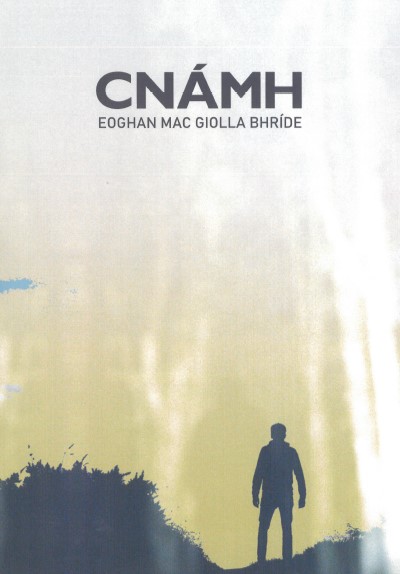Cnámh
Eoghan Mac Giolla Bhríde | Éabhlóid | €14 pb |175pp | 9781916047037
review by Cathal Póirtéir
Cnámh is Eoghan Mac Giolla Bhríde’s third collection of stories, following Idir Feoil agus Leathar (Coiscéim, 2002) and Díbeartaigh (Coiscéim, 2005), but he has been far from idle in the last fifteen years. His publishing company Éabhlóid has also published An Prionsa Beag, Eoghan’s own translation of the French classic by Antoine de Saint-Exupéry, and a growing catalogue of books of contemporary poetry and prose by Ulster writers, including beautifully illustrated children’s books and CDs.
Eoghan is a skilful, dedicated writer and in the seventeen stories here readers see him tackle a range of contemporary situations and characters. For the most part, the stories take place in the Ireland of today, featuring characters trying to come to terms with themselves and the world around them. Eoghan has an ability to create physical and mental environments that are entirely credible. His eye for telling detail sketches the Atlantic coast of Donegal, an apartment in a Dublin square, and the night-time streets and bars of Paris with equal facility. More importantly, perhaps, his characters are believable and interesting.
Most of the stories are third-person narratives but others are first-person descriptions of events that have happened to young and old as they try to navigate the shifting sands of life. For example, we meet children in ‘Sceith’, rebellious teenagers in ‘Teasbhach Samhraidh’, unfaithful partners in ‘An Duine Contrailte’, an aging married couple in ‘An Gunna’ and a confused old woman in ‘Seomra Feithimh’. None of the characters are at one with their worlds and must face anxieties, accidents, threats, misunderstandings, unsatisfactory relationships, personal failings and misgivings. Many of them are damaged, unfulfilled or lonely, searching for a way to overcome a personal crisis, but often remaining out of synch with other characters despite their efforts to find what is missing in their lives. The reader is allowed to discover their fault lines while the characters themselves fail to identify or come to grips with the source of their problems.
Even when I felt I had missed something central in the writer’s purpose in a particular story, the natural flow and the richness of the language made each story a pleasure to read. I will re-read this collection but, on first reading, some of my favourite stories were ‘Teasbhach Samhraidh’, which captured teenage longing and misbehaviour on a sultry summer’s night in Gaoth Dobhair, and ‘Slán le Páras’, where lust and the possibility of love lead a young man to trawl the streets of central Paris to find an elusive free spirit he encountered there one night. In ‘An Duine Contráilte’ we follow the protagonist as he secretly tails his partner across the country when he thinks that she may be cheating on him; a broken childhood friendship is examined in ‘Dóigheanna le Feiceáil’; in ‘Crios na Cruinne’ we find the story of a young woman who has a dream and suddenly decides that a holiday in Ecuador is what she needs to put her life to rights; and the story of a father’s attendance at his son’s First Confession finishes with a sentence that could easily have appeared in many of the other stories in this collection: ‘Tá sé i gcónaí níos fusa rudaí a bhriseadh, a dúirt sé leis féin, ná iad a chóiriú, ach ní raibh neart aige air’.
***

Cathal Póirtéir is a writer and broadcaster who has published several books and CDs on Irish folklore, social history and literature in Irish.












